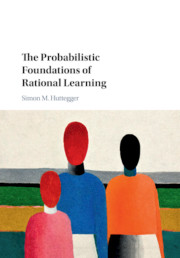Book contents
- Frontmatter
- Dedication
- Contents
- List of Figures
- Preface and Acknowledgments
- Introduction: Abstract Models of Learning
- 1 Consistency and Symmetry
- 2 Bounded Rationality
- 3 Pattern Learning
- 4 Large Worlds
- 5 Radical Probabilism
- 6 Reflection
- 7 Disagreement
- 8 Consensus
- Appendix A Inductive Logic
- Appendix B Partial Exchangeability
- Appendix C Marley's Axioms
- Bibliography
- Index
8 - Consensus
Published online by Cambridge University Press: 25 October 2017
- Frontmatter
- Dedication
- Contents
- List of Figures
- Preface and Acknowledgments
- Introduction: Abstract Models of Learning
- 1 Consistency and Symmetry
- 2 Bounded Rationality
- 3 Pattern Learning
- 4 Large Worlds
- 5 Radical Probabilism
- 6 Reflection
- 7 Disagreement
- 8 Consensus
- Appendix A Inductive Logic
- Appendix B Partial Exchangeability
- Appendix C Marley's Axioms
- Bibliography
- Index
Summary
Differentminds may set out with the most antagonistic views, but the progress of investigation carries them by a force outside of themselves to one and the same conclusion.
Charles S. Peirce How to Make Our Ideas ClearThe kind of probabilism I advocate in this book is very undogmatic in that it typically allows for a range of admissible beliefs in response to the same information. The charge of excessive subjectivity is often brought against such a view. This charge is particularly pressing when the rationality of science is at stake: after all, the emergence of a consensus seems to be one consequence of what it means to respond rationally to scientific evidence. Does radical probabilism have anything to offer that would account for this feature of scientific rationality?
The previous chapter explored learning from other agents. As we have seen, this leads to a consensus only under special conditions, which express an initial agreement among the agents about the structure of the epistemic situation. That agreement is required at some levels in order to get agreement at others is a theme we are going to encounter again in this chapter, in which we set aside learning from others and focus instead on situations where agents revise their opinions based on the same information.
In the epigraph to this chapter, Peirce expresses an optimistic view about this process: learning from the same evidence shall overcome any initial disagreement. There is more than a grain of truth in this statement, as is shown by a number of theorems that I will discuss in this chapter. These theorems go a long way toward showing that probabilistic learning can lead to a rational consensus. However, there are also limits to this. The question of when Jeffrey conditioning leads to a consensus is especially interesting in this regard; we will see that considering Jeffrey conditioning helps reveal a dependence between long-run agreement and whether evidence is solid or soft.
- Type
- Chapter
- Information
- The Probabilistic Foundations of Rational Learning , pp. 167 - 188Publisher: Cambridge University PressPrint publication year: 2017



